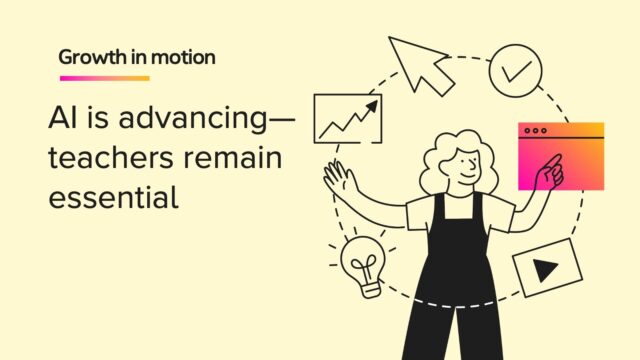
The onset of the COVID-19 pandemic resulted in major shifts in how educators delivered instruction and how they were trained to deliver that instruction. Many schools and districts that had previously delivered all professional learning and coaching in-person quickly shifted to delivering all workshops, courses, and coaching online. As a researcher focused on professional development, this shift also greatly affected the nature and focus of my work. I could no longer observe classrooms and professional development sessions for evidence of improved teaching practices and instead shifted to evaluating online models for delivering professional development and coaching.
While there has been limited research conducted on the efficacy of online professional development, particularly online coaching, early evidence suggests that it has the potential to be as efficacious as in-person coaching. Whether it is delivered in person or online, sustained, job-embedded coaching with coaches who are experts on an instructional model or program is the most effective form of professional learning. Research to date suggests that the medium through which coaching is delivered is less important than the quality and substance of the learning opportunities provided to teachers. Results from a randomized study found significant and sustained effects on teachers’ ability to analyze instruction and on their instructional practice after online coaching, although there were no corresponding increases in math scores as measured by standardized or interim assessments.
A recent meta-analysis on teacher professional development that included 13 studies that evaluated virtual coaching models found effect sizes of 0.49 SD on instructional practices and 0.18 SD on student achievement. There were no significant differences in effect sizes for in-person and virtual coaching programs. The authors identified several aspects of virtual coaching as potential strengths:
- Increasing the number of teachers with whom a high-quality coach can work
- Reducing teachers’ concern about being evaluated by their coach
- Lowering costs while increasing scalability.

HMH recently partnered with a third-party research firm, RMC, to investigate the efficacy of blended professional learning (both in-person and online coaching). The study compared teachers who received blended coaching to teachers who received in-person coaching only. Both quantitative and qualitative results reinforced the efficacy of blended professional learning and the value of additional online coaching sessions. The extent of teachers’ online coaching participation was significantly and positively related to improvements on state ELA assessments and Reading Inventory measures. Each additional coaching session was associated with an increase of 0.25 of a standard deviation on the state ELA assessment, suggesting that with only four online coaching sessions, student scores can, on average, be increased by a standard deviation. Participation in an additional online coaching session was also associated with an average 0.07 increase in ELA performance level and an average increase of 0.06 Reading levels.
“Teachers reported that online coaching was similarly or more useful than in-person coaching.”
Education Research Director, Professional Services, HMH
When compared to students being taught by teachers who only received in-person coaching, being taught by a blended coaching teacher was associated with an increase in decoding status of 0.28 levels, an increase in sight word fluency score of 1.90 points, and an increase in total fluency score of 2.76 points on the Phonics Inventory. In qualitative results, teachers reported that online coaching was similarly or more useful than in-person coaching when focused on data topics and instructional content and resources.
The promising results from this study have helped to bring focus to my work as a researcher and led to new ideas and opportunities for researching online professional development. While there is still much to be learned through future research in this area, this study demonstrates the promise of sustained, job-embedded online coaching that is focused on an instructional program. As more schools and districts realize the cost savings, scalability, and effectiveness of online coaching, it is important to remember that an online coaching program will only be successful if it is implemented by experienced coaches with expertise in the instructional programs being implemented.
***
Join our nationally recognized, professional learning community for ongoing support and on-demand resources.












